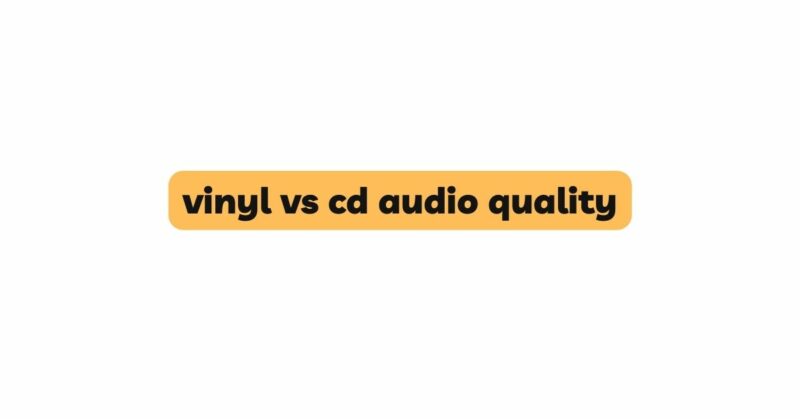The debate over whether vinyl records or CDs have better audio quality has been raging for decades. There are many factors to consider when comparing the two formats, and the answer ultimately comes down to personal preference.
Vinyl Records
Vinyl records are analog recordings, which means that the sound waves are stored as physical grooves on the record. When the record is played, a needle in the record player follows the grooves and vibrates, which creates sound waves. This process is more complex than digital recording, but it can also produce a richer, more natural sound.
Vinyl records also have a wider frequency response than CDs. This means that they can reproduce a wider range of sounds, from the lowest bass notes to the highest treble notes. This can make for a more immersive listening experience.
Finally, vinyl records are often said to have a warmer sound than CDs. This is because the analog recording process introduces some distortion, which can add to the overall richness of the sound.
CDs
CDs are digital recordings, which means that the sound waves are stored as numbers. When a CD is played, a laser reads the numbers and converts them back into sound waves. This process is more precise than analog recording, which can lead to a cleaner, more accurate sound.
CDs also have a higher sampling rate than vinyl records. This means that they can reproduce a wider range of frequencies, which can make for a more detailed sound.
However, CDs also have some drawbacks. They can be more susceptible to compression than vinyl records, which can lead to a loss of sound quality. They also have a smaller dynamic range, which means that they can’t reproduce the very quiet and very loud sounds as well as vinyl records.
So, which format has better audio quality?
The answer to this question is subjective and depends on personal preference. Some people prefer the warmer, more natural sound of vinyl records, while others prefer the cleaner, more accurate sound of CDs. Ultimately, the best way to decide which format has better audio quality is to listen to both and see which one you prefer.
Here are some additional factors to consider when comparing the audio quality of vinyl and CDs:
- The quality of the recording: The quality of the recording is more important than the format when it comes to audio quality. A well-recorded vinyl record will sound better than a poorly recorded digital file.
- The quality of the playback equipment: The playback equipment also plays a role in audio quality. A high-quality turntable and amp will make vinyl records sound better than a cheap turntable and amp.
- Your personal preference: Ultimately, the best way to decide which format has better audio quality is to listen to both and see which one you prefer.
Conclusion
There is no definitive answer to the question of whether vinyl records or CDs have better audio quality. The two formats have different strengths and weaknesses, and the best way to decide which one is right for you is to listen to both and see which one you prefer.
Here are some additional thoughts on the debate over vinyl vs CD audio quality:
- The placebo effect: Some people believe that vinyl records sound better simply because they are more familiar with the sound of vinyl. This is known as the placebo effect.
- The ritual of listening to vinyl: Some people enjoy the ritual of listening to vinyl records, which can include setting up the turntable, putting on the record, and dropping the needle. This can add to the overall listening experience, even if the sound quality is not actually better.
- The nostalgia factor: Vinyl records are often associated with nostalgia, which can also make people believe that they sound better.
Ultimately, the question of whether vinyl records or CDs have better audio quality is a matter of personal preference. There is no right or wrong answer, and the best way to decide is to listen to both formats and see which one you prefer.


